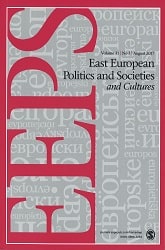Postimperial Democracies: Ideology and Party Formation in Third Republic France, Weimar Germany, and Post-Soviet Russia
Postimperial Democracies: Ideology and Party Formation in Third Republic France, Weimar Germany, and Post-Soviet Russia
Author(s): Stephen E. HansonSubject(s): Political history, Government/Political systems, Comparative politics, Nationalism Studies, History of Communism, Fascism, Nazism and WW II, Post-Communist Transformation
Published by: SAGE Publications Ltd
Keywords: ideology; political parties; nationalism;
Summary/Abstract: Post-Soviet Russia, the early Third Republic in France, and the Weimar Republic in Germany can be understood as cases of “postimperial democracy”—a situation in which a new democratic regime emerges in the core of a former empire that has suddenly collapsed and where democratic elections continue for at least a decade. However, the regimes consolidated in these cases—republican democracy in France, Nazi dictatorship in Germany, and weak state authoritarianism in Russia—vary dramatically. These divergent results reflect the impact of new ideologies, which generated collective action among converts by artificially elongating their time horizons in an environment of extremely high uncertainty. In France, ideological clarity allowed radical republicans to outflank more pragmatic parties; in Germany, ideological clarity allowed the Nazis to mobilize more successfully than centrist parties; and in post-Soviet Russia, the absence of any compelling new political ideology—democratic or antidemocratic—has rendered political parties too weak to challenge even a very weak state.
Journal: East European Politics and Societies
- Issue Year: 20/2006
- Issue No: 02
- Page Range: 343-372
- Page Count: 30
- Language: English
- Content File-PDF

